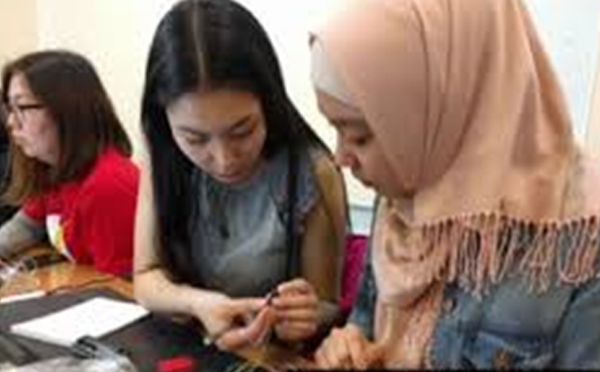Kyrgyzstan: Women’s Share in Economic Growth
Posted on : March 8, 2021Author : Nazia Jafri

Kyrgyzstan recently witnessed a new era of election and referendum. A change is on its way to the country. As the new constitution is getting proposed the role and relevance of women in the economy comes in question. The legal framework of Kyrgyzstan provides gender equality along with equal opportunities in the employment sector. Global treaties on gender equality have been ratified by the nation. According to the law there should be similar prospects for both men and women in social, political and economic domains. But in practice discrimination against women is widely in practice. On paper women gets the same rights as men, as the 2010 constitutions clearly says, “no one may be subject to discrimination on the basis of sex, race, language, disability, ethnicity, belief, age, political and other convictions, education, background, proprietary and other status as well as other circumstances”. This essentially means that in Kyrgyzstan both men and women will enjoy similar rights and freedoms and will share same opportunities for their realization.
Since Kyrgyzstan gained independence women participation in economy has been very low and the same has been the case for senior administrative positions. In early 20s only less than a quarter percentages of women had management positions in the government. Even as of now there is no women head of state and there are no women chiefs among the district police departments as well. In 2020 only 19% women were the members of parliament as compared to the sharp number of 81% men which is really critical for effective participation in decision making.
In 2007, the government issued a 30 percent gender quota for elective posts and later on certain changes were made in 2017 in the laws. The changes were done so that if in case a female deputy quits early in certain situations then she will be replaced by another female only and vice versa. Such amendments were there to ensure that there will be certain amount of women representation but in reality things are very different for Kyrgyz women.
Bir Duino, human rights NGO in Kyrgyzstan, recently carried an analysis which clearly depicts the exploitations that women workers are facing in the region. Among the total number of workers, females are mostly working for the underpaid sectors. A mere percentage of 27.4 company heads are women whereas in comparison 72.6 % are headed by men. There is also a government ruling that limits the number of professions for women to just 400. Human rights organisations from time to time have been asking to pull back such a law which is openly in contrast to the rights of women. According to the statics provided by the National Statistical Committee, 1800 million women have so far been working in the economic sectors in the country. There is a gender segregation that still heads in the region. Even now there are regional disparities and women are barred from decision making. Violence against women is a common feature here including all types.
In this era when International Women’s Day is just around the corner a pertinent question hovers around the economic growth of women in the region. In Kyrgyzstan there is 50.7% population of women against the 49.3% of male population but only 40% workforce is female in comparison to the 59% working male. Due to such levels of unemployment, migration is also very popular among the women in the region for the search of job. Being one of the poorest countries of Central Asia, Kyrgyzstan heavily relies on agriculture. Here the unequal distributions of land and property rights are also very common due to the pre-existing patriarchal dogmas and philosophies. Also many women especially rural women are not very well aware of their rights.
Such limitations create a much reduced opportunity for women including a decline in their socio-economic status and shallow economic prospects. There are a lot of expectations from the new government. The previous government also made huge promises in this regard and kept amendments in consideration to reform the laws on equal rights of men and women. Going by the statistics there is gender imbalance in politics as well. The gap between the positions of men and women is more than 7 times. Even municipal services are not spared; from the available 513 posts women have less than 5%.
In spite of all this women have been quite influential in Kyrgyzstan as compared to the other countries of Central Asia; back in 2010 Roza Otunbaeva became the first female President of the country. Also there are many successful women entrepreneurs there such as Zhanylsynzat Turganbayeva, Ainura Saparbayeva and Nazgul Janybayeva among many others. Nazik Akparova, became the youngest deputy of the village council in the Issyk Kul region at the mere age of 28. Then there was, Aida Kasymalieva, who is both a journalist and politician. She has been quite vocal about women rights in the country. She has been the vice speaker of parliament from 2018-2020. Then there are famous activists such as Shirin Aitmatova who are bold enough to voice their opinions globally. Also a number of women are successful as teachers, doctors, scientists and many other jobs but of course this does not sum up the situation of women in the country.
Kyrgyzstan is a mountainous Central Asian country with a huge rural population. Since its independence from Soviet rule the nation has been facing numerous complications in its attempt to establishing itself. Over the years the region has experienced many prominent modifications in government administration and in policies that were intended at promoting gender equality and development of women. Although within the system, there was always a very strong framework for the economic stability of women but inadequate measures hindered the growth. There is also a disparity between urban and rural women. Religious conservatism and poor financial resources are also major hinderences. With the new government and new ideas in the pipeline it will surely be interesting to see what lies ahead for the future of the women in the nation.
Nazia Jafri
Adjunct, Asia in Global Affairs





Leave a Reply